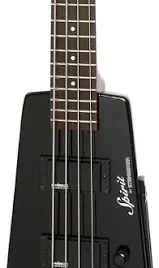Lightweight Bass Guitars
Why Lightweight Bass Guitars Could Be Your New Favorite
I played a Rickenbacker 4001 for many years and I have moved a lot of heavey equipment. I know all about having back issues. Man have I been there—strapped with a heavy bass guitar for hours, feeling the strain on my back and shoulders. That’s where lightweight bass guitars come in. Whether you’re a touring musician or just enjoy long practice sessions, a lighter bass can make a world of difference. In this guide, I’ll walk you through everything you need to know about lightweight bass guitars, from why they matter to which models are worth checking out.
Lightweight bass guitars are a game-changer for many bassists. These instruments offer the same powerful tones and dynamic playability as their heavier counterparts but without the physical strain. Whether you’re playing live gigs, practicing at home, or recording in the studio, a lightweight bass can make your experience more enjoyable and less taxing on your body.
Benefits for Comfort and Playability
The most obvious benefit of a lightweight bass is comfort. If you’re someone who performs long gigs or spends extended periods practicing, a lighter instrument can make those sessions much more bearable. You won’t have to deal with shoulder and back pain that comes with heavier basses, and you’ll have better mobility on stage. Less fatigue means you can focus more on delivering a solid performance.
Impact on Sound Quality
When started wondering if a lighter bass sacrifices sound quality, I was pleasently surpried that it doesn’t! While weightier basses may offer slightly more sustain due to the mass of the body, modern lightweight bass guitars are designed to retain excellent tone. Many of them use specially selected woods and electronics to ensure that you get a full-bodied sound without the extra pounds.
Key Features to Look for in Lightweight Bass Guitars
When shopping for a lightweight bass guitar, it’s not just about finding the lightest instrument on the market. There are certain features you should consider to ensure you’re getting the best bass for your style and sound.
Body Materials and Weight
The material used to build the bass guitar body is one of the most significant factors affecting its weight. Some woods are heavier than others, so choosing the right material is key to getting a lighter bass.
Popular Tonewoods for Lightweight Basses
Woods like basswood, alder, and poplar are commonly used in lightweight basses due to their lower density. Basswood, in particular, is known for being lightweight and producing a warm, well-rounded tone. Alder is another popular option, offering a balance between light weight and tonal versatility.
How Different Woods Affect Weight and Tone
While basswood is lighter, it tends to have a softer tone, making it perfect for genres like pop or jazz. Alder, on the other hand, provides a bit more brightness and is often favored in rock and funk styles. If you’re looking for something even more exotic, woods like swamp ash can also offer a lightweight option with a unique tonal signature.
Neck Design and Its Influence on Overall Weight
The neck of your bass guitar plays a big part in how heavy the instrument feels. Some basses have thicker necks that add weight, while others feature slimmer designs to keep things light. Look for basses with thinner necks or even short-scale models, which reduce the overall length and weight of the instrument.
Hardware and Electronics in Lightweight Bass Guitars
Another aspect to consider is the hardware and electronics. Lightweight bass guitars often use compact, high-quality components that don’t add unnecessary weight. Look for lightweight tuners, bridges, and control knobs, which can all contribute to reducing the weight of the instrument without compromising on performance.
Top Lightweight Bass Guitar Models
If you’re in the market for a lightweight bass, here are some of the top models that offer comfort without sacrificing tone.
Fender Mustang Bass
The Fender Mustang Bass is an iconic lightweight option for players who want a punchy tone in a smaller, more comfortable package. With its shorter scale and lighter body, it’s ideal for bassists who need a reliable instrument that won’t weigh them down during long performances.
Why It’s a Favorite for Players Seeking Comfort
The Mustang Bass has a reputation for being incredibly comfortable to play, even for those with smaller hands. Its compact design makes it easy to navigate, and despite its size, it packs a serious punch in terms of sound. It’s great for players who need versatility but don’t want to sacrifice comfort.
Ibanez SR Series
The Ibanez SR series is known for producing some of the most lightweight and versatile basses on the market. These basses are designed with ergonomics in mind, making them a top choice for players who want a sleek, lightweight instrument with a fast-playing neck.
What Makes the SR Series Lightweight and Versatile
One of the standout features of the SR series is the slim, lightweight body combined with a thin neck profile. This allows for fast, fluid playing and reduces the strain on your hands and shoulders. Plus, the SR series offers a wide range of tonal options, making it suitable for a variety of musical styles.
Squier Classic Vibe Jaguar Bass
If you’re looking for an affordable lightweight bass that doesn’t skimp on quality, the Squier Classic Vibe Jaguar Bass is worth checking out. It’s got the vintage-inspired looks and lightweight feel that make it an excellent choice for players of all levels.
Affordability Meets Lightweight Design
The Classic Vibe Jaguar Bass gives you a lightweight body at a price point that won’t break the bank. Its shorter scale and comfortable body make it easy to play for extended periods, while still delivering a rich, punchy tone that can hold its own in live settings.

Choosing the Right Lightweight Bass for Your Playing Style
Finding the perfect lightweight bass isn’t just about the specs—it’s about matching your bass to your playing style, comfort, and genre. Here’s how you can make sure your bass guitar suits you.
Matching Tone Preferences with Body Material
If you’re after a bright, punchy tone, alder might be your best bet. For warmer, softer sounds, basswood is a solid choice. Understanding how the tonewoods contribute to the sound will help you pick the perfect bass for your style.
Ergonomics: How to Find the Most Comfortable Fit
Comfort is king when it comes to bass guitars. Look for models with contoured bodies and thinner necks to reduce fatigue. Some basses also have ergonomic designs that are specifically crafted to make them easier to play for long sessions.
Considering Your Genre and Performance Needs
The genre you play can also dictate which lightweight bass is right for you. If you’re playing jazz or pop, you might lean toward a basswood body for a more mellow tone. Rock and funk players, on the other hand, might prefer something with more bite, like alder.
Modifying Pickups for Enhanced Sound
Upgrading your pickups can dramatically change the sound of your lightweight bass. Look for pickups that enhance the natural tone of your bass’s body material, whether you’re after more clarity, warmth, or punch.
Conclusion:
A lightweight bass guitar can truly transform your playing experience. Not only does it offer comfort and ease of play, but it also ensures that I can focus on the music instead of my aching back. Whether you’re a seasoned performer or just starting out, finding the right lightweight bass will make your time playing more enjoyable and your sound more dynamic. With options like the Fender Mustang or the Ibanez SR series, you can find the perfect blend of weight, tone, and style to fit your needs.
FAQs
Q1: Does a lightweight bass guitar affect sound quality?
Not necessarily. While heavier basses may have more sustain, lightweight basses can still offer excellent tone depending on the materials and construction used.
Q2: What’s the best wood for a lightweight bass guitar?
Basswood, alder, and poplar are popular choices for lightweight bass guitars due to their lower density and tonal characteristics.
Q3: Can I customize a lightweight bass guitar?
Absolutely! You can modify the pickups, hardware, and even the finish to suit your personal taste and playing style.
Q4: Are lightweight bass guitars good for live performances?
Yes, they are perfect for live performances due to their comfort, especially for long gigs where you need mobility and reduced fatigue.
Q5: What are some good lightweight bass models for beginners?
The Squier Classic Vibe Jaguar Bass and Fender Mustang Bass are excellent beginner-friendly options that are lightweight and affordable.




